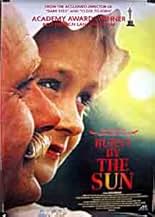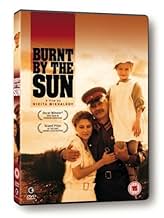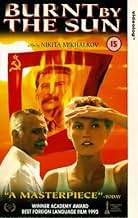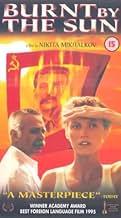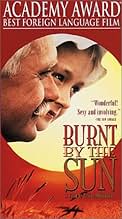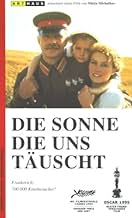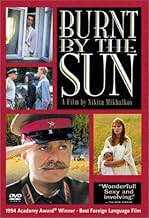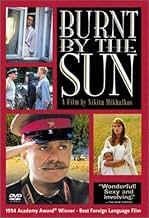AVALIAÇÃO DA IMDb
7,8/10
17 mil
SUA AVALIAÇÃO
Na União Soviética, em 1936, a repressão de Stalin repousa sobre um herói da revolução. As acusações de ser ele um espião estrangeiro são um disparate, e todos sabiam disso, mas um processo ... Ler tudoNa União Soviética, em 1936, a repressão de Stalin repousa sobre um herói da revolução. As acusações de ser ele um espião estrangeiro são um disparate, e todos sabiam disso, mas um processo lento da queda de sua vida já está em andamento.Na União Soviética, em 1936, a repressão de Stalin repousa sobre um herói da revolução. As acusações de ser ele um espião estrangeiro são um disparate, e todos sabiam disso, mas um processo lento da queda de sua vida já está em andamento.
- Direção
- Roteiristas
- Artistas
- Ganhou 1 Oscar
- 4 vitórias e 9 indicações no total
Ingeborga Dapkunaite
- Marusya
- (as Ingeborga Dapkunayte)
Nadezhda Mikhalkova
- Nadya
- (as Nadya Mikhalkova)
André Oumansky
- Filipp
- (as Andre Umanskiy)
Avaliações em destaque
10Prozacc
Just saw this film as the closing class in my first term Russian language class. It's one of the ten best films I've ever seen. Our professor grew up in the Soviet Union and at the end (no spoilers, I promise) she had to leave because it was too familiar. I wasn't informed until afterwards that it was based on a true story, but it didn't matter. As I watched it I actually forgot that it was subtitled, and my memory of it now is as though it was in English. My point by saying that is that it was so real, so powerfully directed and acted, that the language barrier didn't matter one bit. Stunning film.
I just watched and loved this movie.
It originally portrays the contrast in character, personality, viewpoint, and the relative consequences of the Revolution upon two people -
a) Mitya, a handsome, charming, romantic, poetic, musical, child-loving man who before the movie began, lived in rural Russia, grew up with a girl who was 7 when he was conscripted into World War I, and deeply loved her parents, cousins, aunts, uncles and the household servants, and
b) Kotov, an older man, military, probably more courageous and less intelligent, bluff and physical, sentimental and less artistic, stronger but simpler, equally child-loving, from a poorer background.
Enemies in the Revolution, their behavior toward each other begins with cruelty by Kotov toward Mitya, Mitya's forced cruelty to others, and a changed and cruel man now (and knowing it) Mitya's cruelty to Kotov. And yes, a woman is also in the mix. The story is told as much through Kotov's eyes as through Mitya's.
And guess what? With all this cruelty, Kotov and Mitya are both people you'd love to spend the day with.
It's beautifully photographed - the same wonderful languor as watching say, Turgenev's A Month in the Country, the child is enchanting, the story is absolutely fascinating - far more original than such other "political" movies as The Conformist or The Garden of the Finzi-Continis. The movie is about social class, temperament, and how freely people make decisions in their lives, about love for the opposite sex, children, and country. It's compelling - you will truly always remember this movie.
It originally portrays the contrast in character, personality, viewpoint, and the relative consequences of the Revolution upon two people -
a) Mitya, a handsome, charming, romantic, poetic, musical, child-loving man who before the movie began, lived in rural Russia, grew up with a girl who was 7 when he was conscripted into World War I, and deeply loved her parents, cousins, aunts, uncles and the household servants, and
b) Kotov, an older man, military, probably more courageous and less intelligent, bluff and physical, sentimental and less artistic, stronger but simpler, equally child-loving, from a poorer background.
Enemies in the Revolution, their behavior toward each other begins with cruelty by Kotov toward Mitya, Mitya's forced cruelty to others, and a changed and cruel man now (and knowing it) Mitya's cruelty to Kotov. And yes, a woman is also in the mix. The story is told as much through Kotov's eyes as through Mitya's.
And guess what? With all this cruelty, Kotov and Mitya are both people you'd love to spend the day with.
It's beautifully photographed - the same wonderful languor as watching say, Turgenev's A Month in the Country, the child is enchanting, the story is absolutely fascinating - far more original than such other "political" movies as The Conformist or The Garden of the Finzi-Continis. The movie is about social class, temperament, and how freely people make decisions in their lives, about love for the opposite sex, children, and country. It's compelling - you will truly always remember this movie.
"Burnt by the Sun" is a powerful example of what a genuinely Russian movie can be when it uses the good sides of western film-making : a coherent plot, professional camera work, and freedom of expression, all things that were rare for the cinema of Soviet times. Of course, it is not surprising that it was made by Nikita Mikhalkov, one of the few Russian directors who achieved lasting world success during communism, and therefore he had the right contacts abroad to get a decent budget. Though, "Burnt by the Sun" is way better than Mikhalkov's pompous "Barber of Siberia", which was alloted more money than any other film in the history of Russian cinema.
In "Burnt by the Sun", Mikhalkov was able to give us a palpable feeling of the beauty and genius of Russia. The lighting is magnificent all the way through, and the ripe and wide wheat fields shine like gold. The action takes place in a cozy dacha among the birch trees, a house which seems to be the nest of a bunch of gentle and carefree eccentrics, all in an atmosphere that reminds pleasantly of Tchekov.
Yet, you can tell from the start that "Burnt by the Sun" is not going to be just a comedy, as the first scene opens on a man cutting his veins in a bathtub while the telephone is ringing. However, this first forewarning soon gets forgotten throughout most of the film, which keeps a warm, light-hearted, slightly nostalgic tone almost all the time. It is only towards the middle you realize that it starts looming slowly towards predictable tragedy, and this only gets obvious in the very last moments.
It turns out that the characters we see are all members of an old aristocratic family who were spared the horrors of the revolution because the younger daughter, Marusia, married a Red Army colonel, much older than she is. Thus, they keep on living as they ever did, playing cards, drinking tea from samovars, making private jokes in French. They even have a maid and a parrot. They seem totally oblivious of the reality around them. Except for innocent looking balloons with Stalin's face on them and a few parading pioneers, the communist regime is visible almost only through the presence of colonel Kotov, brilliantly played here by Nikita Mikhalkov himself.
Colonel Kotov impersonates a character very familiar to the Russian mentality : he is tall, strong, authoritarian, but at the same time protective, warm-hearted, charming and prone to jokes. He is about just as sympathetic as the gruff milkman with a heart of gold in "Fiddler on the Roof". Although he is a military, he is not the kind of guy you think as having blood on his hands. But of course Lenin and Stalin's aura over Russian people was also partly due to the fact that they represented strong and protective father figures.
The story takes a sudden turn with the arrival of an enigmatic character disguised as a Santa Claus in the middle of summer. He turns out to be known by everyone in the house, as he is the adoptive child of the late grandfather. In fact, he was Marusia's childhood companion, and her lover in the first place, but was evicted by Kotov, who protected henceforth the whole family from repression. It soon becomes clear that the man, called Mitya, has come to take revenge for his shattered life.
All performances here are good, even though Nikita Mikhalkov, as an actor, still manages to steal the show. But one will not either forget the performance of his then six-year old daughter Nadya , who also plays his daughter in the movie. A charming, energetic and witty child performance which impersonates the innocence of the family about to be lost.
The French title for the movie was "Deceitful Sun", and I find it more appropriate. Although the film bathes in quiet sunlight, it deals with one of the darkest eras of Russian/Soviet history : Stalinism. In the early 1930's, Stalin decided to eliminate much of the newly arisen communist elite whom he did not trust anymore, and hired former enemies of communism, or half-criminals, to eradicate his own official allies. Thus, colonel Kotov remains self-righteous and sure of himself almost until the end because he simply cannot believe that Stalin will not protect him.
Needless to say that "Burnt by the Sun" is one of the first Russian movies that deals so openly with the subject. A subject which still remains quite sensitive since millions of people had their lives shattered by those events. Unlike what happened for Nazism, it was not until the end of the communist regime that it was possible to discuss it openly, even though Stalin's deeds had already been condemned officially a long time before. Therefore, this superb drama is also the symbol of a historical breakthrough.
In "Burnt by the Sun", Mikhalkov was able to give us a palpable feeling of the beauty and genius of Russia. The lighting is magnificent all the way through, and the ripe and wide wheat fields shine like gold. The action takes place in a cozy dacha among the birch trees, a house which seems to be the nest of a bunch of gentle and carefree eccentrics, all in an atmosphere that reminds pleasantly of Tchekov.
Yet, you can tell from the start that "Burnt by the Sun" is not going to be just a comedy, as the first scene opens on a man cutting his veins in a bathtub while the telephone is ringing. However, this first forewarning soon gets forgotten throughout most of the film, which keeps a warm, light-hearted, slightly nostalgic tone almost all the time. It is only towards the middle you realize that it starts looming slowly towards predictable tragedy, and this only gets obvious in the very last moments.
It turns out that the characters we see are all members of an old aristocratic family who were spared the horrors of the revolution because the younger daughter, Marusia, married a Red Army colonel, much older than she is. Thus, they keep on living as they ever did, playing cards, drinking tea from samovars, making private jokes in French. They even have a maid and a parrot. They seem totally oblivious of the reality around them. Except for innocent looking balloons with Stalin's face on them and a few parading pioneers, the communist regime is visible almost only through the presence of colonel Kotov, brilliantly played here by Nikita Mikhalkov himself.
Colonel Kotov impersonates a character very familiar to the Russian mentality : he is tall, strong, authoritarian, but at the same time protective, warm-hearted, charming and prone to jokes. He is about just as sympathetic as the gruff milkman with a heart of gold in "Fiddler on the Roof". Although he is a military, he is not the kind of guy you think as having blood on his hands. But of course Lenin and Stalin's aura over Russian people was also partly due to the fact that they represented strong and protective father figures.
The story takes a sudden turn with the arrival of an enigmatic character disguised as a Santa Claus in the middle of summer. He turns out to be known by everyone in the house, as he is the adoptive child of the late grandfather. In fact, he was Marusia's childhood companion, and her lover in the first place, but was evicted by Kotov, who protected henceforth the whole family from repression. It soon becomes clear that the man, called Mitya, has come to take revenge for his shattered life.
All performances here are good, even though Nikita Mikhalkov, as an actor, still manages to steal the show. But one will not either forget the performance of his then six-year old daughter Nadya , who also plays his daughter in the movie. A charming, energetic and witty child performance which impersonates the innocence of the family about to be lost.
The French title for the movie was "Deceitful Sun", and I find it more appropriate. Although the film bathes in quiet sunlight, it deals with one of the darkest eras of Russian/Soviet history : Stalinism. In the early 1930's, Stalin decided to eliminate much of the newly arisen communist elite whom he did not trust anymore, and hired former enemies of communism, or half-criminals, to eradicate his own official allies. Thus, colonel Kotov remains self-righteous and sure of himself almost until the end because he simply cannot believe that Stalin will not protect him.
Needless to say that "Burnt by the Sun" is one of the first Russian movies that deals so openly with the subject. A subject which still remains quite sensitive since millions of people had their lives shattered by those events. Unlike what happened for Nazism, it was not until the end of the communist regime that it was possible to discuss it openly, even though Stalin's deeds had already been condemned officially a long time before. Therefore, this superb drama is also the symbol of a historical breakthrough.
Having read all of the negative commentaries on this film, I would first like to point out that severely criticising the period of Soviet history in which Utoml'ennye Solntsem takes place, and in that effort, condemning the people of that era such as are portrayed in this film as being entirely culpable for their actions, is all very well and good to do from hindsight, and from the safety of a soft computer chair in the modern-day West. Because of course, no one is tortured today in the West for a casual remark against the reigning despot; nor do we live under the threat that our families may be sent off to Siberia as one of the consequences of our actions, great or trivial. I myself can't say what I would have been willing to do under the circumstances that existed during the time of the Soviet purges, whom I would have betrayed just to survive, or if I would have the courage to make some kind of moral, social, or political stand, and if I think I could have? Well,if we all admit it to ourselves, we know that torture will break any man eventually... In watching this film, I think that we should keep in mind that we are not necessarily here to judge but to take the director's journey to another time and place: and yet we should still be able to remember and respect the fact that what we are seeing here is a piece of the history that lies beneath the modern day Russia. This history is a shadow that has cast its pall over the lives of every Soviet citizen since then, including Mikhalkov. The fear of the purges that swept over the Soviet Union during the 1930's and 40's is a kind of fear that will fade, but never die away entirely. So, what can be the point in overly criticising Mikhalkov or any one in the former USSR for surviving under the system as it was before glasnost, knowing what they knew of the state and the full extent of what it could do and had already done (Stalin's purges may even have claimed 20-40 million lives)? If Utoml'ennye Solntsem is Mikhalkov's attempt to exonerate his "cooperation" with the Soviet system within his own time, what has he really got to vindicate or to feel guilty about? That being said, and despite the fact that numerous films, books, and media have copiously used this subject to tell a story, it is not a subject which can be exhausted but a rich treasure of unusual human experiences. And, as some have pointed out, this film is far more than just a story of revolutionary politics or a tale of betrayal: it IS a love story, between men and women, and between men and their motherland. Moreover, I was sincerely moved by the love triangle between Marussya, Mitya, and Kotov. Utoml'ennye Solntsem is not, however, a film that will make you laugh often, and would not at all were it not for the undeniable charm of the bold little Nadya. Utoml'ennye Solntsem will make those who appreciate the tragic element within history, and in particular, this era of political turmoil, shed more than a few tears. Because the truth lingers behind this tale, the truth of a time which was a nightmare few of us can imagine... or would want to. In my opinion, the great thing about this film is that it throws us back for a while into that era and portrays what was good about it, what remains good, despite all obstacles; the film is a tale of love that survives the most extreme of human conditions. It is fascinating and compelling, brave and tender, horrifying, and real. Not for everyone, but certainly a masterpiece within its genre.
This movie is about the most desperate and tragic situation in the human life. This is when our life is determined by external forces. Even the most basic form of happiness - being with you family, enjoying your child - were impossible in the Russia of Stalin.
Sometimes I think about people who were borne 20 years before World War II in Germany, Poland or Russia. I wonder whether they had a feeling that the life was extremely unfair to them. The feeling that your fate was determined by the time you were borne in, and that you couldn't do anything at all to somehow change it. If Mitya, Kotov and Marusya would not die then, they would have to wait for 50 years to be able to truly understand what happened to them and who was to blame for it.
I was puzzled why Mitya picked up the phone and agreed to arrest Kotov. Why didn't he stop his suffering immediately, as he knew that he had no other option than ruining lives of the people he loved. Was it his hatred towards Kotov and the opportunity to take revenge for being expelled for 10 years? Was it the last hope that his love to Marusya would reverse her marriage?
After watched the film again & again I decided that he knew from the offset there was no way out. Mitya went to his old home because he wanted just one thing - to say farewell to his dream that the old times would ever return. The dream that made him betray his comrades in the 20th, and come back from France in the 30th.
I'm so happy that we live in freedom and that the iron curtain fell.
Sometimes I think about people who were borne 20 years before World War II in Germany, Poland or Russia. I wonder whether they had a feeling that the life was extremely unfair to them. The feeling that your fate was determined by the time you were borne in, and that you couldn't do anything at all to somehow change it. If Mitya, Kotov and Marusya would not die then, they would have to wait for 50 years to be able to truly understand what happened to them and who was to blame for it.
I was puzzled why Mitya picked up the phone and agreed to arrest Kotov. Why didn't he stop his suffering immediately, as he knew that he had no other option than ruining lives of the people he loved. Was it his hatred towards Kotov and the opportunity to take revenge for being expelled for 10 years? Was it the last hope that his love to Marusya would reverse her marriage?
After watched the film again & again I decided that he knew from the offset there was no way out. Mitya went to his old home because he wanted just one thing - to say farewell to his dream that the old times would ever return. The dream that made him betray his comrades in the 20th, and come back from France in the 30th.
I'm so happy that we live in freedom and that the iron curtain fell.
Você sabia?
- CuriosidadesOne of four Russian films ever to win Academy Award for Best Foreign Language Film. The others are Guerra e Paz (1965), Dersu Uzala (1975) and Moscou Não Acredita em Lágrimas (1980)
- ConexõesFeatured in Namedni 1961-2003: Nasha Era: Namedni 1995 (1999)
- Trilhas sonorasUtomlennoe solntse
Written by Jerzy Petersburski (as Ezhi Petersburgskiy)
Lyrics by Iosif Alvek (uncredited)
Performed by Mark Simkin (singer), Efim Vyshkin (violin), Aleksandr Bashkatov (bayan), and Viktor Agapov (guitar)
Played by an instrumental quartet during opening credits as a film's theme song
Principais escolhas
Faça login para avaliar e ver a lista de recomendações personalizadas
- How long is Burnt by the Sun?Fornecido pela Alexa
Detalhes
- Data de lançamento
- Países de origem
- Central de atendimento oficial
- Idiomas
- Também conhecido como
- Burnt by the Sun
- Locações de filme
- Empresas de produção
- Consulte mais créditos da empresa na IMDbPro
Bilheteria
- Orçamento
- US$ 2.800.000 (estimativa)
- Faturamento bruto nos EUA e Canadá
- US$ 2.302.338
- Fim de semana de estreia nos EUA e Canadá
- US$ 60.074
- 23 de abr. de 1995
- Faturamento bruto mundial
- US$ 2.313.461
- Tempo de duração2 horas 15 minutos
- Cor
- Mixagem de som
- Proporção
- 1.66 : 1
Contribua para esta página
Sugerir uma alteração ou adicionar conteúdo ausente

Principal brecha
By what name was O Sol Enganador (1994) officially released in India in English?
Responda

